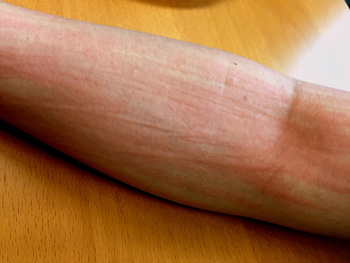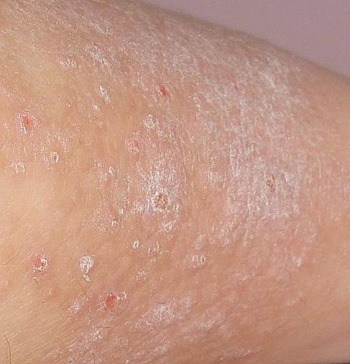|
Itching is the most common symptom in skin problems. Traditional Chinese medicine (TCM) believes that itching is usually associated with wind pathogens. A wind condition is characterized by rapid development, constant changing, migrating and maybe widespread too. Wind pathogens consume the body's blood and fluids, and thus result in dryness. They also tend to affect the upper body or the body surface. Wind pathogens usually lead other pathogens to attack the body, resulting in complex situations. TCM also believes that itchy feeling is associated with the spirit activities in the heart, resulting in symptoms such as irritability, insomnia and restless in severe itchy cases.
There are many reasons for skin itching, different causes will lead to different clinical features. TCM physicians rely on the four examination skills to evaluate patients and to make diagnosis. They will gather all symptoms and signs of a patient, and then group into a syndrome or disharmony pattern as diagnosis. Below are important criteria for TCM physicians to diagnose itchy conditions.
| Acute itchy conditions often fit in with following features: |
 |
Wind-cold disharmony: severe itching that usually aggravated in cold or windy environment; individuals are also sensitive to low temperatures, and the pulse is floating and slow. |
 |
Wind-heat disharmony: severe itching that usually aggravated in hot environment, and alleviated in cold environment; individuals also accompany with thirst and a floating and rapid pulse. |
 |
Wind-damp-heat disharmony: severe itching with blisters or oozing in the affected body surface. |
 |
Blood over-heated disharmony: the itching often accompanies with skin swelling, red bumps or wheals, and individuals tend to have irritability and a deep red tongue. |

Blood over-heated disharmony: the itching often accompanies with skin swelling, red bumps or wheals.
|
| Chronic itchy conditions that last for months are more complicated: |
 |
Cold disharmony: this type is usually associated with yang deficiency of spleen and kidney. The skin may not appear red rash and swelling but develops nodules or ulcers. Individuals also have cold signs such as aversion to cold, limb coldness, abdominal distention, loose bowels and lumbar soreness. |
 |
Dampness disharmony: lingering itching with blisters, erosion or discharges on the skin lesion. The lower body parts are likely involved. Individuals have a greasy white tongue coating, and the pulse is rolling or deep and slow. |
 |
Blood stasis disharmony: besides itching, purple spots, darkened areas and nodules may be found on the skin |
 |
Phlegm disharmony: besides itching, nodules, circular or dry scaly patches can be found on the skin. |
 |
Wind formation from blood deficiency: persistent generalized itching with dry and scaly skin; scratching marks, bleeding marks and even thickened area may be found. The tongue is pale or has teeth marks, and the pulse is deep and thready. |
 |
Wind formation from yin deficiency: generalized itching that tends to worse at night, individuals also have throat dryness, a red tongue with little coating, and a thready pulse. |

Blood deficiency disharmony: skin dryness, scaling, bleeding marks and even thickening.
|
Clinically, most individuals present a mixed pattern, and will be changeable during the course of itchy condition, thus an experienced physician is needed to ensure an accurate diagnosis and appropriate treatment. TCM anti-itch remedies are usually provided for both oral intake and external applications; the oral remedies are aimed to rectify the internal disharmony, while external remedies can work directly on the skin to achieve a quicker relief.
It should be noted that long-term relief requires finding and treating the underlying problems of itching. Individuals may need to undergo special diagnostic tests to rule out problems like diabetes, live diseases or other health problems. It is also necessary for individuals to pay attention to any triggering or aggravating factor of their itching in the daily activities and environment.
|